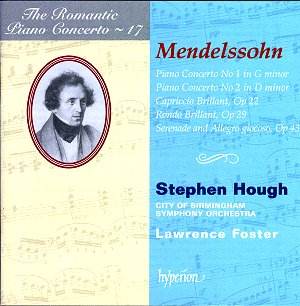Judging by the impressive quality of Houghís playing
here Mendelssohn was no mean player either. Framed by three ten to twelve
minute light-hearted single movement works, the two concertos (already
more familiar to music lovers than the bulk of Hyperionís Romantic Piano
Series because they sustain a fairly regular position in the repertoire)
are always a pleasure to listen to. Mendelssohnís short life, cut short
in 1847 as concert life and the technical developments of the piano
and the techniques of its performers were beginning to hot up, thanks
largely to Liszt, precluded a role for him. He certainly disapproved
of Lisztís performing antics, not for Mendelssohn the paraphrase of
opera tunes of other composers though he himself was a fabulous improviser,
but he remained part of the circle (including the Schumanns and Chopin)
of innovative executants as well as composers. In this latter capacity
he was not driven to ground-breaking when it came to matters of style,
for one can find plenty of signs of Mozart, Beethoven and Weber in his
writing as well as absorbing the influences by his contemporaries. The
relationship between piano and orchestra is a case in point; as with
Chopinís two concertos, the solo instrument hardly rests while the orchestraís
contribution is of relatively little import. Nevertheless the music
of these works, all written in the 1830s, is always both charming and
delightful. The finale of the first concerto remains a particular favourite
with this reviewer, vibrantly thrilling once past the slightly portentous
orchestral opening. There is an almost operetta flavour to its main
melody, essentially a galop from the music of the salon, and none the
worse for that. That Liszt sight-read it flawlessly from Mendelssohnís
manuscript in front of the composer in Erardís Paris showrooms made
an indelible impression on the composer, despite his opinion of the
showman pianist.
Mendelssohn would surely have approved of the performances
here; Houghís playing provides a broad palette of colour, plenty of
sparkle, lyrical warmth of tone and a sense of ease in the clarity of
the passage work. But we all know itís far from easy. Lawrence Foster
and the CBSO make the most of the infrequent opportunities to shine
in the orchestral ritornelli and accompany with stylish sensitivity.
Christopher Fifield


